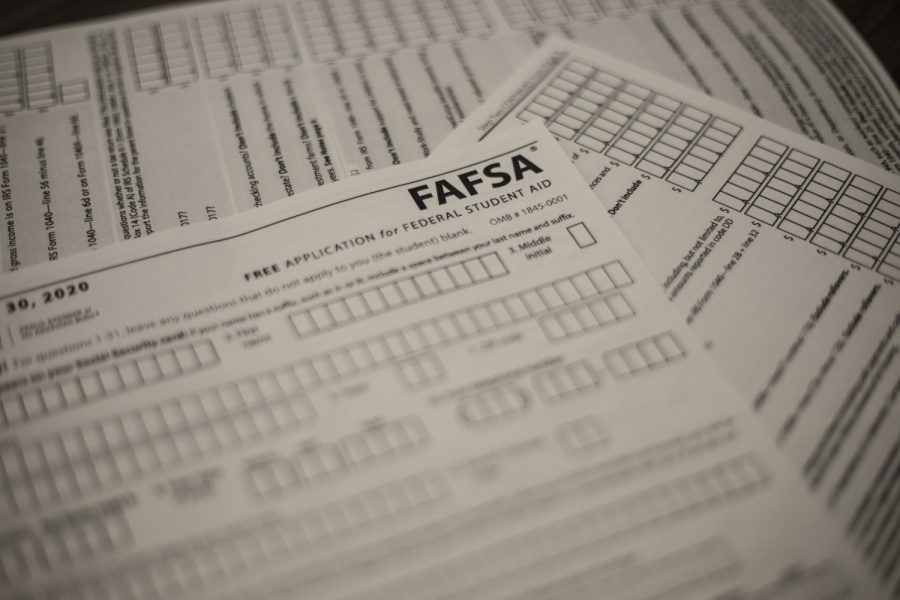UI adds financial literacy initiatives
Financial Literacy Services is collaborating with various UI departments this fall to adapt its programs to assist all students. With new initiatives, students can increase their financial understanding on and off campus.
Photo Illustration by Ryan Adams.
September 29, 2019
The University of Iowa Financial Literacy Services is taking a new approach in its interaction with students this fall, providing new initiatives to engage more students in learning how to successfully manage money.
Financial Literacy and Counseling Associate Director Kelsey Ryder said Financial Literacy Services is an extension of the UI Office of Financial Aid, but the division’s work goes beyond aspects of financial aid.
First-year students are more likely to visit the office, Ryder said, but services are open to all students. One-on-one appointments with faculty members divvy up into conversations about loan repayment and counseling, the Free Application for Federal Student Aid, budgeting, and more.
She added that the office saw more than 600 students for general one-one-one meetings last year, and more than 800 students attended its 50 workshops. Each meeting is specialized and allows for better feedback when it comes to creating workshops, Ryder said.
RELATED: Legislators entertain possibility of financial literacy requirement
Financial Literacy Services also offers private-loan counseling, which a total of 1,726 students used last year, Ryder added. Approximately 48 percent of students in 2018 had loans, she said, so the department works to help students manage that money.
“This year, we are starting to work closer with the [Center for Diversity and Enrichment] and students who are veterans. We’re doing two workshops at their new space, one on budgeting and one on [the federal-aid application],” Ryder said. “We are also trying to reach out to the graduate-student community as well. We offer phone meetings to them since they’re typically busier.”
Financial Literacy Services, however, is not the only office on campus trying to help students learn how to better manage their money.
The office often partners with TRIO Student Support Services to create courses for the 350 students it serves at the university, said Cassie Walizer, student success coach and tutor coordinator at TRIO.
A part of the UI Center for Diversity and Enrichment, TRIO assists first-generation students, low-income students, and students with disabilities, Walizer said.
It’s a federal-grant program, she said, and the UI is the only college campus with an eight-semester corresponding program, which was developed and redesigned with the help of Financial Literacy Services in 2017.
“The [Financial Literacy Services] team were instrumental partners when it came to creating a financial literacy curriculum for our students,” Walizer said. “They come in and advise students in our classes and then can meet one-on-one with the same people and develop a relationship with them.”
RELATED: Banzai, 10,000 years of financial life
Associate Dean of University College Andrew Beckett said in an email to The Daily Iowan that financial literacy is one of the first steps students must take when they arrive on campus. He added he believes this is the third year CashCourse was included in Success at Iowa.
“The online modules are good starting points for students interested in financial literacy,” Beckett said. “It’s certainly not meant to be the last opportunity for students. Exposing students to basic concepts will hopefully help them consider those issues later in life.”
Financial-literacy requirements at the UI are part of a larger 2017 initiative by the state Board of Regents to educate students in their finances and reduce the amount of debt they may accumulate by graduation. The push to increase financial literacy among students also coincides with consistent tuition hikes for students attending regent universities.
Walizer said students should take advantage of the online resources at their disposal to manage such costs.
“It’s important to go to one-on-ones or call [Financial Literacy Services],” she said. “Building practicing habits is important. Start budgeting now not later so you know how you’re spending your money.”
People who participate in Financial Literacy Services are not the only ones who can benefit from what it has to offer, Ryder added. The conversation of financial literacy is one that can be discussed day to day.
“Meeting professionals is important, but brainstorming with other students is also helpful,” Ryder said. “Take the time to sit and look at your options to improve your financial literacy.”






